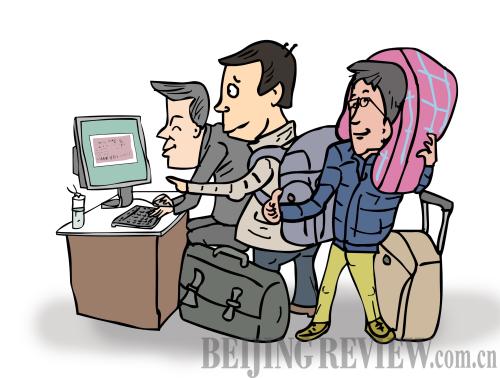|
 |
|
(LI SHIGONG) |
Spring Festival is fast approaching, fueling a massive travel rush. How to get your hands on a train ticket for the journey home is currently the hottest topic, and biggest headache, amongst the Chinese public.
Given this, some software companies provide specialized add-ons that enable netizens to cut ahead in online ticketing queues when visiting 12306.cn, the Railways Ministry's official ticket booking website.
While some passengers certainly benefit from the use of "plug-ins," such types of software interrupt normal operations and cause security concerns. The Ministry of Industry and Information Technology has already announced a ban on such programs.
Some think that issuing bans on such software is a "lazy and passive reaction" to the problem, pointing out the necessity of improving the official ticketing system. The following are excerpts of opinions.
Hua Huacheng (Xinhua Daily Telegraph): For quite some time, the mainstream opinion has held that the development and popularization of Internet technology has narrowed the gap between different regions and social classes in terms of information access. As a result, online ticketing should be a walk in the park. Instead, the introduction of special browsers make it even more difficult for more than 200 million migrant workers, who don't have access to the Internet, to get online tickets.
The principle of fair and equal distribution of public resources is thus undermined and opposed to narrowing gaps, certain types of software are in fact increasing division. "Technical queue jumping" is damaging the fairness of public resource distribution.
Zhou Yunhua (www.chnrailway.com): The Ministry of Railways said that, by frequent information browsing and forced queue jumping, normal ticketing operations have been seriously interrupted, impacting the interests of the vast majority of travelers. It's just like running traffic lights on the road. When normal traffic flow is disrupted, drivers are forced to slow down. In order to better protect online ticketing, the Ministry of Railways has taken relevant technical steps and suggested that related software companies cease operating special browsers.
While some support specialized software programs, others worry about their moral implications in disturbing normal market and Web order. The introduction of online and telephone ticketing services has created a fairer and more convenient environment for passengers, which special browsers undermine.
The Spring Festival travel rush includes mostly those who work far away from their hometowns. Preferring phones or visiting ticket office in person, such passengers receive little benefit from the Internet as it is, never mind from special programs that only put them at a disadvantage.
It has been pointed out that some browsers, instead of being free lunches offered by kind people, contain viruses capable of stealing personal online bank information. Due to their overall negative impact, I suggest special software programs need to be banned.
In addition, if the online ticket booking website is sufficiently upgraded to satisfy passenger service demands, the necessity of specialized software programs will naturally become redundant.
Huang Guoxing (www.cjn.cn): "Crowded" and "rushing" are among the common feelings shared by passengers using the official ticket booking website when buying train tickets. The major culprits behind such emotions include demand outpacing supply, technical problems and railway authorities' incapability to deal with emergency conditions. Those who use special browsers are similar to traffic light runners, who add to congestion by disrupting the rules.
While they might help to speed up the process of booking tickets for certain group of people, special software programs often make matters far worse.
While the Ministry of Industry and Information Technology has implemented a clear ban on the use of all kinds of special browsers for ticket booking, some companies still turn a deaf ear.
If access to train tickets is made more user friendly, then there would be no need for special kinds of software. Of course, the Spring Festival is indeed a big test to the overall transportation system of China, and the railway alone can't solve the problem. Cooperation between civil aviation, road and water transport authorities is essential.
Ji Li (www.cctime.com): In order to standardize ticket sales and avoid a possible system crash, an official ban on special browsers has been put in place.
As for government interference with specialized software, many argue that these browsers mainly hurt senior or mid-aged migrant workers who have limited knowledge of modern technology. However, those who have used such programs to buy tickets say they are fairer than preserving tickets for special passengers. Others have noted that if official ticket booking services improve, no one would use "plug-ins".
No matter how you look at it, the popularity of special browsers implies that the official system needs further improvement. Train tickets should be distributed through increased channels to provide the public with a fair purchase opportunity. Otherwise, even if special software programs are out of use, passengers will continue fighting a losing battle in their attempts to reach home.
Dear Readers,
Forum is a column that provides a space for varying perspectives on contemporary Chinese society. We invite you to submit personal viewpoints on past and current topics (in either English or Chinese).
Email us at: zanjifang@bjreview.com
Please provide your name and address along with your comments. | 